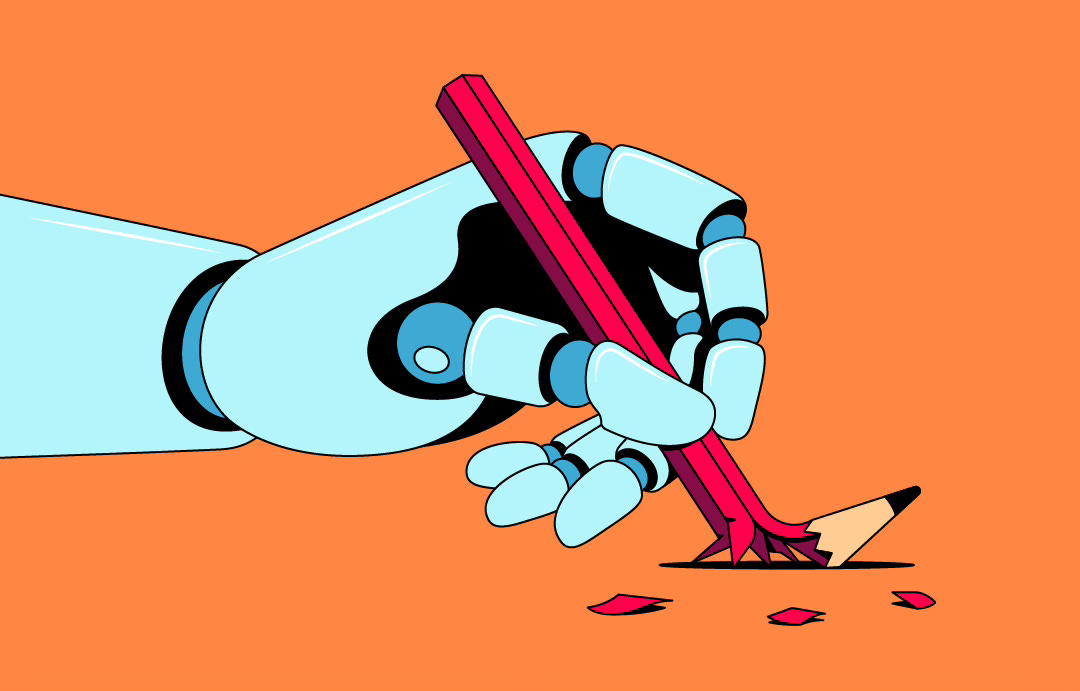For many Royal Literary Fund Fellows and grant beneficiaries, supplementing income through copywriting and content commissions is part of making a living as a professional writer. And one of the key topics concerning professional writers of all kinds right now is AI. There's no doubt AI tools have their uses, but how concerned should writers be about the potential impact on livelihoods?
With this in mind, we're opening up the conversation about AI. To kick us off, we invited guest contributor Craig Brett of Freelance Writing Studio to share how the emergence of AI checkers – which are also being adopted by education institutions – has impacted his copywriting business, and what happened when he spoke openly about this topic on LinkedIn.
Evolution, innovation and technology have all driven change. You only have to look back over the last few centuries to see the progress we have made. From generating power by using water to taking to the skies to connecting with others using the World Wide Web, the world has become a very different place.
I am no dinosaur when it comes to technology – in fact, I embrace it as much as possible. But when you find yourself in a constant battle with it, your feelings change, and this is where I am with Artificial Intelligence (AI). I am talking about the likes of ChatGPT and AI detection tools, and my resentment for these tools comes from the fact that I am a copywriter.
AI has some extraordinary potential uses. Given that it is still in its infancy, what it has achieved in such a short space of time is nothing short of incredible. However, it has also created a number of significant challenges for professional writers, especially when it comes to maintaining trust with clients, safeguarding reputations and generating work.
When AI detection tools threaten credibility, a line is crossed
I have been operating as a freelance copywriter for 12 years and for the last six years it has been my full-time occupation. As soon as I went full-time, the work came in thick and fast. I use freelance platforms and my own website to generate business, and I quickly began working with large clients. I was absolutely staggered at the amount of work I was taking on and eventually had to start outsourcing work. I had no other choice.
Some of my current clients, even to this day, have been working with me for many years. These are relationships that have been forged on trust and are based on an understanding that simply works – because one of the beauties of innovation and technology is that it allows these relationships to develop even if you aren’t meeting people face-to-face.
But what happened in July of 2024 was the straw that broke the camel's back. A longstanding client questioned my work after an AI detector flagged some of my content as having been AI-generated.
I cannot lie, it was not the first time this has happened. Something similar happened in December of 2022. I fought back hard, because back then I had no idea what ChatGPT was, but I lost that client. Ah well, you win some, you lose some, but AI won’t be a problem for me, I told myself.
From that moment on, every few months, someone would come to me with AI detection results. I would plead my case and send all possible proof, and most clients would be understanding. I had never experienced anything like it before. I was having to prove my worth, and prove that my writing was my own work.
Back to July 2024, the moment of change. This was the moment where I thought, I cannot take this any longer. I wanted to fight back, again. I reassured my client, created the content again, and recorded my screen as I typed out every single word. I sent the video file and the new content. It was still flagging up some AI detection but there was an improvement. Furthermore, the video made the client realise that something was not right – you’re telling me, I thought.
So, I put the content through the same AI detection checker my client had used to see the results for myself. I made changes, the score went up, then it went down – I was chasing my own tail, and I was completely lost. That was until I added in two full stops. The score immediately jumped from 43% likelihood of AI down to 0%. Wow. I already had strong feelings about AI detection tools but this told me all I needed to know: you cannot trust these tools.
The LinkedIn post that sparked a conversation
Armed with my frustration and a passion to discover what was happening, I took to LinkedIn. I threw all my feelings out onto the screen and typed out a post, trying to be as coherent and professional as possible. I felt like my work and credibility had been unfairly evaluated by automated tools, and I wanted to find out if other writers had faced the same response. Within a matter of minutes of hitting the publish button, all hell broke loose, and in a good way!
The post gained traction quickly. It resonated with other writers and sparked a huge discussion within the copywriting and content-writing communities.
Others were replying about the exact same problems. More importantly, they were expressing their concerns about how AI is undermining credibility and threatening livelihoods.
To date, the post has had almost 1,200 comments, been reposted 660 times, had 7,400 likes or reactions and achieved over 660,000 impressions. This kind of reaction doesn’t happen for no reason. It happened because there was a lot of truth in what I had posted, and others were feeling my pain and frustration.
Where does this leave me and other copywriters?
Sadly, my income from writing is half of what it was before AI arrived. I am no longer outsourcing because those writers have had to move into employment. I was VAT registered and operating as a limited company, but that’s changed too. All as a result of AI.
There is a real concern throughout the industry about job security and a decline in opportunities. How are we supposed to fight against AI detection tools when people are choosing to believe them over our words?
Copywriters are also fearful about intellectual property (IP) and the way AI learns from human-written content without credit. All of this leads to ethical concerns about the ownership of IP and the value associated with original writing. There are massive problems on the horizon.
I know that I have lost clients to AI. Some value AI content as sufficient, but all this does is devalue the craftsmanship and depth of human-written content. This impacts the demand and also the pricing for skilled copywriters. I think that is a very sad position to be in, especially as this was an industry that was thriving.
What’s the next move?
Should there be industry standards in place?
Perhaps professional advocacy should become a priority, whereby policies are put in place that protect writers’ rights.
Are writers expected to ride out this storm while forfeiting earnings and seeing a reduction in demand? Are we saying, Enough is enough, AI has won?
Writers need to remain proactive, keep a level of transparency and accountability, and also improve our knowledge of AI tools. Many of us are left wondering why we should add these extra layers of complication when we are already working extremely hard to deliver high-quality content for our clients.
So, here we are. Fight or Flight. These are challenging times, and all we can keep on doing is being true to ourselves as professional writers.
One thing is for sure, I know from the reaction to my post that as a community we are strong and we need to harness that strength to create one voice – a voice that gets noticed and makes a stand against AI because realistically, that is all we can do for now.
Coming soon - AI and the Future of the Novel and Ten Ways AI Can Help Writers.






